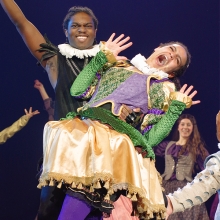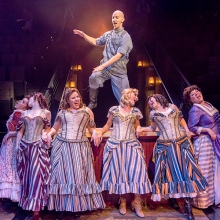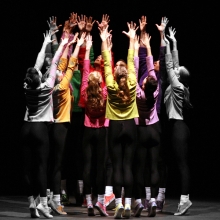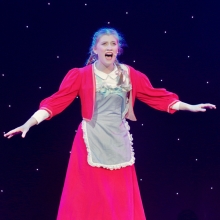Show History
History
Inspiration
Candide is based on the 1759 French novella, Candide: Or, the Optimist by Voltaire. The novella is characterized by its satiric tone and fast-moving plot. Lillian Hellman was initially attracted to the source material and wanted to write a play with music; however, Leonard Bernstein was so excited by the idea that he convinced Hellman to write it as a musical. Critics viewed the initial version that they created together as too serious; rumor having it that Hellman saw a parallel between Voltaire's story and 1950s McCarthyism. The 1974 version had a tone that hewed more closely with the sarcastic tone of the original Voltaire. The 1999 script builds upon that, including scenes and songs that had been cut from the 1974 version.
Productions
The original version of Candide opened on Broadway at the Martin Beck Theatre on December 1, 1956, with a book by playwright, Lillian Hellman (it was her first time working on a musical), music by Leonard Bernstein and lyrics by poet Richard Wilbur, John Latouche and Dorothy Parker.
The original cast included Robert Rounseville (Candide), Max Adrian (Pangloss), Irra Petina (Old Lady) and future Broadway legend Barbara Cook (Cunegonde). Despite its distinguished pedigree, the show ran only 73 performances.
It took 18 years for Candide to become a Broadway hit. With a new libretto by Hugh Wheeler, a revised score with new lyrics by Wilbur and Stephen Sondheim, and director, Harold Prince's, environmental staging (where the action literally surrounded the audience), Candide opened at the Chelsea Theater Center in Brooklyn on December 18, 1973. It played there for seven weeks before transferring to Broadway, where it opened at the Broadway Theatre on March 10, 1974.
The show was then further revised. New versions premiered with the New York City Opera on October 13, 1982, and the Scottish Opera on May 19, 1988. The Scottish Opera version became the basis for yet another revised score, which Bernstein recorded in 1989.
In 1999, John Caird adapted and revised Candide yet again for the Royal National Theatre. His adaptation expands on the one-act 1973 version, adding characters, rearranging scenes and putting back songs that had been lost along the way. Richard Wilbur contributed new lyrics. Mr. Caird went back to the original source material, Voltaire's masterpiece of satire, to give this new Candide additional spice.
Cultural Influence
- Trevor Nunn asked John Caird to rework the script for the 1999 production at the Royal National Theatre in London.
- After being performed at New York City Opera in 1982 under Prince s direction, Candide became part of New York City Opera's repertoire. It has since been performed by opera companies around the world.
- One of the most famous songs from the score is also a famed song in the musical theater canon: "Glitter and Be Gay". It has been recorded and performed by many respected artists, including Barbara Cook and Kristen Chenoweth, who sang it with The Boston Pops.
- The original Candide attained a cult following with the release of its original-cast album. The recording led critics and musical theatre fans to a new appreciation of the score. The overture quickly became a concert staple throughout the world.
- There are now two versions of Candide licensed by MTI: the 1974 version and the John Caird 1999 version.
Trivia
- Because of the challenging and diverse roles, Candide has become a frequently produced and popular piece in many top music schools.
- After its initial production before being revisited in 1974 and again in 1999, Candide developed a reputation as a show with a glorious score that was crippled by an unworkable book. This was reinforced by productions and concert stagings at the Theater Group of UCLA (featuring Carroll O'Connor as Pangloss and directed by Gordon Davidson, who would later head the Mark Taper Forum), New York's Philharmonic Hall (now Avery Fisher Hall, featuring Madeline Kahn as Cunegonde and Alan Arkin as Pangloss), and the John F. Kennedy Center in Washington (featuring comedian Robert Klein as Pangloss).
- Harold Prince has won more Tony Awards than anyone else (20): eight for directing, eight for producing, two as producer of the year's Best Musical, and two special Tony Awards.




